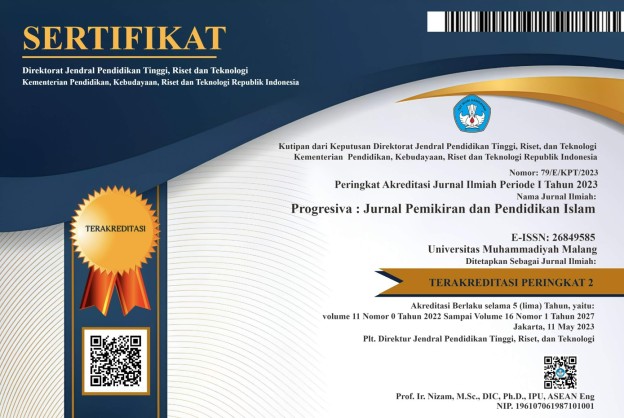The Rahmatan Lil-'Alamin Paradigm as an Approach to Islamic Education in Muhammadiyah Institutions
DOI:
https://doi.org/10.22219/progresiva.v12i01.29382Keywords:
Islamic Education, Paradigm, Rahmatan Lil alamin, MuhammadiyahAbstract
This study examines the Rahmatan Lil-'Alamin paradigm as a distinctive Islamic approach to reshaping the educational environment in Muhammadiyah schools. The need to comprehend how this paradigm, which is based on the idea of universal compassion and justice, affects the pedagogical framework and ethos inside Islamic educational institutions connected to Muhammadiyah is what spurred the study's development. The methodology utilised in this study entails a thorough examination of curriculum papers, interviews with important figures in the field of education, and classroom observations at a few Muhammadiyah institutions. The study aims to comprehensively understand how the Rahmatan Lil-'Alamin paradigm is converted into educational practises, values, and learning outcomes within the Muhammadiyah school system by triangulating different data sources. The study's findings show that the Rahmatan Lil-'Alamin paradigm has been subtly woven into the instruction fabric at Muhammadiyah schools. This integration is clear in the curriculum's planning, instruction delivery, and creating a supportive and welcoming learning environment. The study also clarifies how this paradigm affects students' character development by promoting a feeling of societal duty, empathy, and ethical consciousness. By offering insights into the actual use of the Rahmatan Lil-'Alamin paradigm within Muhammadiyah institutions, this research contributes to the larger conversation on Islamic education. It not only draws attention to the distinctive characteristics of Islamic education within this paradigm but also emphasises how it can help achieve the larger objectives of comprehensive and socially responsible education within an Islamic framework.
Downloads
References
Ainuri, A. F. Y. (2020). Maqashid Syari’Ah Sebagai Epistemologi Pendidikan Pancasila. Jurnal PROGRESS: Wahana Kreativitas Dan Intelektualitas, 8(1), 76. https://doi.org/10.31942/pgrs.v8i1.3446
Akmaliah, W. (2020). The demise of moderate Islam: New media, contestation, and reclaiming religious authorities. Indonesian Journal of Islam and Muslim Societies, 10(1), 1–24. https://doi.org/10.18326/ijims.v10i1.1-24
Al-Attas, S. M. N. (1980). The Concept of Islamic Education. The Keynote Address Delivered at the First World Conference on Muslim Education, 16. https://doi.org/10.1007/s13398-014-0173-7.2
Ansori, A., & Juliansyahzen, M. I. (2022). The Contestation of the Family Law Discourse in the Digital Age: Islam, State, and Gender. … Keluarga Dan Hukum Islam. https://jurnal.ar-raniry.ac.id/index.php/samarah/article/view/9128
Azizah, Q. (2021). Konsep Tauhid Ibnu Taimiyah dan Pengaruhnya Terhadap Pembaharuan Pemikiran Islam. 12(2), 181–197.
Baharun, H., & Finori, F. D. (2019). Smart Techno Parenting: Alternatif Pendidikan Anak Pada Era Teknologi Digital. Jurnal Tatsqif, 17(1), 52–69. https://doi.org/10.20414/jtq.v17i1.625
Bakti, A. F. (2018). Media and religion: Rodja tv’s involvement in the civil society discourse for community development. Jurnal Komunikasi: Malaysian Journal of Communication, 34(3), 226–244. https://doi.org/10.17576/JKMJC-2018-3403-13
Budiardjo, M. (1971). Dasar-Dasar Ilmu Politik (Issue 1). Gramedia.
Fadli, M. R. (2021). Memahami Desain Metode Penelitian Kualitatif. Humanika, 21(1), 33–54. https://doi.org/10.21831/hum.v21i1.38075
Fauziddin, M., Suryanti, S., & Wiryanto, W. (2022). Community-Based Education and Regional Culture, Has It Been Put into Practice? AL-ISHLAH: Jurnal Pendidikan, 14(2), 1069–1078. https://doi.org/10.35445/alishlah.v14i2.2067
Febriana, L., Tobroni, Faridi, Aziz Mustamin, A., & Nava Sari, T. (2022). Implikasi Konsep Insan Kamil Ibnu Arabi terhadap Pendidikan Islam Berkemajuan. International Conference on Tradition and Religious Studies, 1(1), 133–144.
Helmy, M. I., Kubro, A. D. J., & Ali, M. (2021). The Understanding of Islamic Moderation (wasaṭiyyah al-Islam) and the Hadiths on Inter-religious relations in the Javanese Pesantrens. Indonesian Journal of Islam and Muslim Societies, 11(2), 377–401. https://doi.org/10.18326/ijims.v11i2.377-401
Hendro, S. (2020). Membaharui Dunia Lewat Semangat Persaudaraan Global. Mitra Sriwijaya: Jurnal Teologi Dan Pendidikan Kristen, 1(2), 1–22. https://doi.org/10.46974/ms.v1i2.21
Hidayat, A. (2018). Pembaharuan Pendidikan Islam Menurut Muhammad Abduh. Jurnal Mandiri, 2(2), 369–384. https://doi.org/10.33753/mandiri.v2i2.49
Khaldun, I. (1982). Mukaddimah Ibnu Khaldun (Suatu Pendahuluan) 1. Faizan: Jakarta.
Kholid, M., Andriana, N., Alkattani, A. H., & Supraha, W. (2022). Educational Thought Adian Husaini: Concepts and Practices. At-Ta’dib, 17(1), 142. https://doi.org/10.21111/at-tadib.v17i1.7892
Kistoro, H. C. A., Kartowagiran, B., Naim, N., Latipah, E., Putranta, H., & Minggele, D. (2020). Islamophobia in education: perceptions on the wear of veil/ niqab in higher education. Indonesian Journal of Islam and Muslim Societies, 10(2), 227–246. https://doi.org/10.18326/IJIMS.V10I2.227-246
M Alwi AF, Nurfadilah, K., & Hilman, C. (2022). Pendidikan Luar Sekolah dalam Kerangka Pendidikan Sepanjang Hayat. JIEPP: Jurnal Inovasi, Evaluasi, Dan Pengembangan Pembelajaran, 2(2), 90–95. https://doi.org/https://doi.org/10.54371/jiepp.v2i2.216
Mukhlis, F. (2022). The Implementation of al-Mâ’ûn’s Theology in the Philanthropy of Muhammadiyah Citizens in Malaysia. TSAQAFAH, 18(1), 19. https://doi.org/10.21111/tsaqafah.v18i1.7007
Nakissa, A. (2020). Security, Islam, and Indonesia An Anthropological Analysis of Indonesiaâs National Counterterrorism Agency. Bijdragen Tot de Taal-, Land- En Volkenkunde, 176(2–3), 203–239. https://doi.org/10.1163/22134379-bja10004
Parhan, M., Riezky, P. A., Alifa, S., & Riezky Sarah Alifa, P. (2020). Analisis Metode Baru Dakwah Hanan Attaki Di Era Konvergensi Media:(Studi Deskriptif Pada Akun Instagram @Hanan_Attaki) ANALISIS METODE BARU DAKWAH HANAN ATTAKI DI ERA KONVERGENSI MEDIA (Studi Deskriptif Pada Akun Instagram @hanan_attaki). Komunida: Media Komunikasi Dan Dakwah, 10, 175–196. https://doi.org/10.35905/komunida.v7i2.http
Parker, L. (2014). Religious Education for Peaceful Coexistence in Indonesia? South East Asia Research, 22(4), 487–504. https://doi.org/10.5367/sear.2014.0231
Qomaruzzaman, B. (2021). The theology of non-violenct islamic education based on al-sira al-nabawiyya. HTS Teologiese Studies / Theological Studies, 77(4). https://doi.org/10.4102/hts.v77i4.6268
Rachmadani, F. (n.d.). Wasathiyah: Theory and Practice in Muhammadiyah Fatwa During the Covid-19 Pandemic. 43–51.
Rafliyanto, M., & Mukhlis, F. (2023). Optimizing Learning: Applying the Pomodoro Technique in Islamic Education. El-Tarbawi, 16(1), 153–176. https://doi.org/10.20885/tarbawi.vol16.iss1.art6
Rahman, K., & Noor, A. M. (2020). Moderasi Beragama di Tengah Pergumulan Ideologi Ekstremisme (1st ed.). UB Press Malang.
Ratna, N. N., & Elihami, E. (2021). The Strategy In Non-Formal Education : Learning Of Islamic Education Based On The Community. Jurnal Edukasi Nonformal, 2(1), 101–108. http://journals.ums.ac.id/index.php/warta
Rosnani Hashim, & Imron Rossidy. (2000). Islamization of Knowledge : A Comparative Analysis of the Conceptions of. Intellectual Discourse, 8(I), 19–44.
Sa’adi. (2021). Countering Islamophobia in Portugal: Experience of Indonesian Muslim expatriates. Indonesian Journal of Islam and Muslim Societies, 11(1), 29–53. https://doi.org/10.18326/IJIMS.V11I1.29-53
Salik, M. (2019). Conserving moderate Islam in Indonesia: An analysis of Muwafiq’s speech on online media. In Journal of Indonesian Islam (Vol. 13, Issue 2, pp. 373–394). https://doi.org/10.15642/JIIS.2019.13.2.373-394
Sanaky, H. A. H. (2008). Permasalahan dan Penataan Pendidikan Islam Menuju Pendidikan yang Bermutu. El-Tarbawi Jurnal Pendidikan Islam, I(1), 83–97. https://doi.org/https://doi.org/10.20885/tarbawi.vol1.iss1.art7
Sarmiji. (2020). Peranan Epistemologi Dalam Membangun Hukum Islam. Journal of Islamic Law and Studies, 4(1), 2–9.
Somad, M. A. (2021). Pentingnya Pendidikan Agama Islam dalam Membentuk Karakter Anak. QALAMUNA: Jurnal Pendidikan, Sosial, Dan Agama, 13(2), 171–186. https://doi.org/10.37680/qalamuna.v13i2.882
Sugiyono. (2008). Metode Penelitian Pendidikan-Pendekatan Kuantitatif, Kualitatif, dan R&D, cet. 5. Alfabeta.
Sutarna, N. (2019). Strengthening character education based on Islam for millennial generation in digital era. Proceeding IAIN Batusangkar. https://ojs.iainbatusangkar.ac.id/ojs/index.php/proceedings/article/view/1311
Tahir, M. (2023). Effective Da’wah (Proselytizing) in the Era of Society 5.0: The Perspective of Students in Indonesian State Islamic Higher Education. Risalah, 34(1), 52–71.
Tobroni. (2008). Pendidikan Islam: Paradigma Teologis, Filosofis dan Spiritualitas. UPT. Penerbitan UMM.
Zuhdi, M. (2018). Challenging moderate muslims: Indonesia’s muslim schools in the midst of religious conservatism. In Religions (Vol. 9, Issue 10). https://doi.org/10.3390/rel9100310
Zulkifli. (2010). Al-Islām al-mu’tadil wa thaqāfat Bangka Belitung: al-manẓūrāt al-antrūbūlūjīah. In Studia Islamika (Vol. 17, Issue 3).
Downloads
Published
How to Cite
Issue
Section
License
Copyright (c) 2023 Khamam Khosiin, Tobroni Tobroni, Khozin Khozin

This work is licensed under a Creative Commons Attribution-ShareAlike 4.0 International License.


















